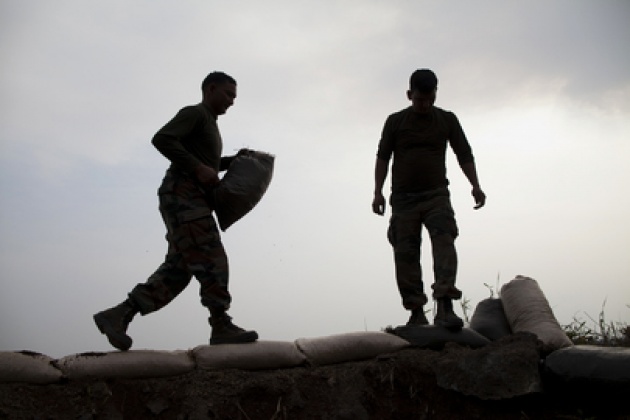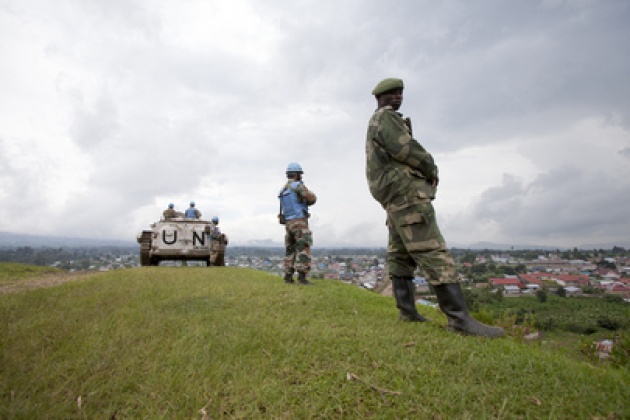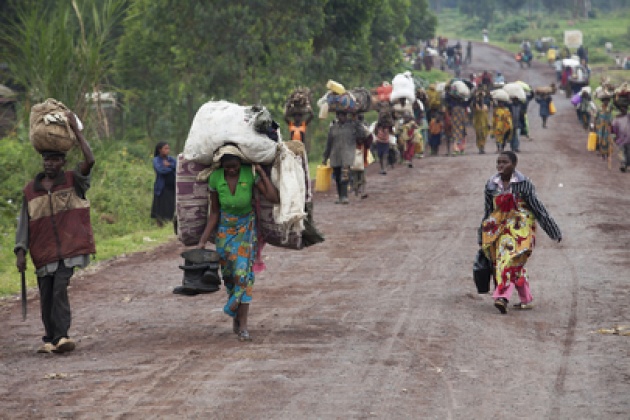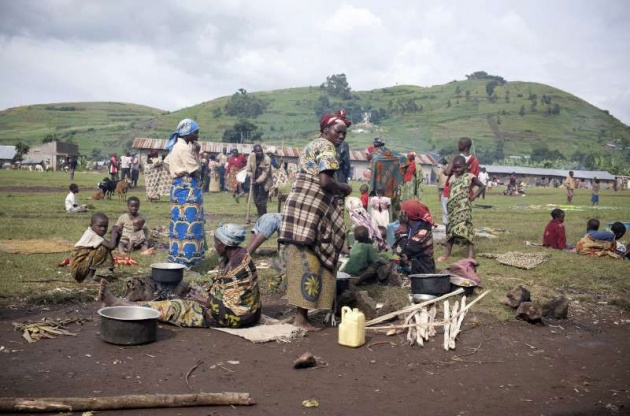
“Our staff and partners in Uganda, Rwanda and eastern DRC have been receiving regular and extensive reports of widespread human rights violations and abuses. These include indiscriminate and summary killings of civilians, rape and other sexual abuse, torture, arbitrary arrests, assaults, looting, extortion of food and money, destruction of property, forced labor, forced military recruitment, including children, and ethnically-motivated violence,” according to spokesperson for the Office of the UN High Commissioner for Refugees (UNHCR), Andrej Mahecic, (Full Statement Below)

UN Peacekeepers Confronting Rebellion
After around 4 months of fighting in the most recent cycle in the DRC presumably ignited by a military rebellion (M23) but also suspected of involving outside forces/neighboring countries, almost half a million persons have been displaced and both a human rights and humanitarian catastrophe is unfolding, with minimal political response. UN officials and the Security Council have condemned the M23’s attacks, with the Council demanding that all forms of support to it and other armed groups in the country cease immediately. However, the fighting, abuses and displacement appear to continue. UN peacekeepers have joined the fight to confront and to prevent M23 from expanding its area of control. See our Blog for Film: “Congo Proxy Wars & Attack Helicopters”.

Forced Recruitment & Other Grave Violations of International Humanitarian Law:
“UNHCR urges parties to the conflict to avoid targeting the civilian population and populated areas. We call on all parties to the conflict to take all steps to protect the civilian population and to prevent indiscriminate and disproportionate attacks.” As the fighting continues, large areas of North Kivu have been left without an adequate security presence, according to UNHCR. In the province’s Masisi and Walikale territories, several armed groups have taken advantage of the power vacuum to attack villages as well as settlements for internally displaced persons (IDPs). The armed groups have destroyed and looted houses, killed people belonging to ethnic groups seen as hostile, and subjected entire communities to extortion.
Ambassador Muhamed Sacirbey - FOLLOW mo @MuhamedSacirbey
Facebook-Become a Fan at “Diplomatically Incorrect”
Twitter – Follow us @DiplomaticallyX
For many further current news event articles, see our popular video blogs at - www.diplomaticallyincorrect.org
UN Top Photo Caption:
"Fighting between the Congolese Armed Forces (FARDC) and the rebel group known as M23 has intensified in Rutshuru Territory of North Kivu province, in eastern Democratic Republic of the Congo (DRC). The rebels are reported to have gained control of several towns, and to be getting closer to the North Kivu capital Goma. Peacekeepers of the U.N. Organization Stabilization Mission in the Democratic Republic of the Congo (MONUSCO) are seen at the defence lines of Kibati, where they have been positioned to prevent M23 rebel incursion towards Goma."

UNHCR Statement:
The UN refugee agency has condemned rampant abuses against civilians in eastern Democratic Republic of the Congo amid fighting that has uprooted nearly half a million people in four months.
The conflict that intensified between government troops and armed rebel groups in June is believed to have displaced more than 470,000 people in eastern DRC. This includes some 220,000 in North Kivu, 200,000 in South Kivu and more than 51,000 who fled to neighbouring Uganda (31,600) and Rwanda (19,400).
The massive displacement is fuelled by atrocities committed on the ground, said UNHCR spokesman Andrej Mahecic in Geneva on Friday.
"Our staff and partners in Uganda, Rwanda and eastern DRC have been receiving regular and extensive reports of widespread human rights violations and abuses," he said. "These include indiscriminate and summary killings of civilians, rape and other sexual abuse, torture, arbitrary arrests, assaults, looting, extortion of food and money, destruction of property, forced labour, forced military recruitment, including children, and ethnically-motivated violence."
As the fighting rages on, large areas of North Kivu province are left without an adequate security presence. In the Masisi and Walikale territories, several armed groups have taken advantage of the power vacuum to attack villages and IDP settlements, destroying and looting houses, killing people belonging to ethnic groups seen as hostile, and subjecting the entire communities to extortion.
From April to July 15, aid agencies recorded more than 7,000 protection incidents in the North Kivu territories of Masisi, Walikale, Rutshuru and Beni. There may be more cases that go unreported as victims – mostly villagers and internally displaced people (IDPs) – are unable, too scared or ashamed to speak out, especially in rape cases.
Forced recruitment is also widespread. Earlier this month, for example, an armed group in Rutshuru forced 145 people to transport their ammunition. Some IDPs were beaten and injured for refusing to join another armed group.
Civilians fleeing into Uganda told similar stories. In the first two weeks of July – when there was heightened military activity across the border – an unusually high number of young men aged 14 to 20 years arrived at the Nyakabande transit centre in Uganda. Some told our staff they were fleeing a recruitment campaign. Many said they saw young men and minors being forced to join the rebels to carry ammunition. Two boys were found with wounds on their shoulders from carrying heavy weapons. There were also reports that armed men were blocking the escape routes for many of those fleeing to Uganda. Two people who left the transit centre to pick up their families in the DRC were arrested in the border town of Bunagana.
In Rwanda, recent arrivals reported looting and verbal and physical harassment of people speaking Kinyarwanda particularly in Masisi territory, but also in Rutshuru and Kalehe.
Mahecic expressed concern that the fighting in eastern DRC is conducted without any respect for the safety of civilians and in clear violation of international humanitarian and human rights principles. "UNHCR urges parties to the conflict to avoid targeting the civilian population and populated areas," he said. "We call on all parties to the conflict to take all steps to protect the civilian population and to prevent indiscriminate and disproportionate attacks."
The deteriorating security situation in eastern DRC is severely affecting UNHCR's capacity to deliver assistance outside the established IDP camps north and west of North Kivu's capital Goma. In the camps and settlements of Uganda and Rwanda, the refugee agency and its partners provide shelter, protection, medical and psycho-social counseling for victims of violence.
By Andrej Mahecic



